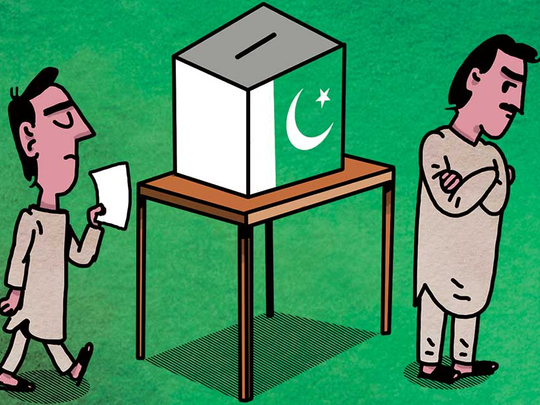
Though some legal challenges on constituency delimitation remain, Pakistan seems on its way to the general elections scheduled for July 25. Earlier the caretaker prime minister took the oath of office on June 1, setting the stage for the elections.
Demographically, Punjab province (which is half of Pakistan) is the battleground where the Pakistan Muslim League — Nawaz (PML-N) has held power except for Musharraf era hiatus, for nearly 30 years. It is being challenged strongly by Imran Khan’s Pakistan Tehreek e Insaaf (PTI). A substantial win in the Punjab is necessary for any party to form a government at the national level.
Notwithstanding the heated campaign, low voter turnout is one of the major problems. At 55.02 per cent in 2013, the highest since 1970 and 1977 elections Pakistan remains among countries with lowest voter turnout. Getting people out to vote will be Imran Khan’s big challenge.
For a serious voter, economy should be the central issue in any election campaign — not so regrettably in Pakistan. Successive governments have left people uneducated, to be swayed by empty rhetoric. In a country of 200 million, just about 1.3 million pay taxes. With external debt around $100 billion (Dh367 billion), much of it built during the last regime the immediate question for the country is how to prevent insolvency. The foreign exchange reserves, largely made up of borrowed money, are sufficient for only two months imports. The public-sector enterprises, stuffed with cronies, have accumulated losses of Rs3.7 trillion over the last five years and there is no public debate on the economic nightmare.
Imran Khan, doggedly campaigning against top level corruption, has made it one of the central issues in the run up to the elections. Yet, he faces a dilemma as more and more so called ‘electable’ — people whom he campaigned against, join his party. Due to clan-based politics he needs them to break the PML-N’s hold over Punjab. Many of course are uncomfortable with Nawaz Sharif’s belligerent rhetoric, which is losing its appeal.
The real problem going forward is that the candidates are much the same and do not have the right focus on the direction to take the country. There is no agreed national agenda.
Though it’s too early to predict, this will be a much tougher election than the last one. Given the patronage politics mastered by the PML-N over three decades it will still be an uphill battle for the PTI to secure a minimum of 140 out of 272 general national assembly seats to have a good chance of forming a government at the federal level. If PTI can win these seats there is every chance that this trend will continue for the Punjab assembly, control of which is crucial for stability at the federal level. Playing victim, the PML-N remains on the offensive. The expected judgement in money laundering cases against Nawaz Sharif, where he is widely expected to be found guilty and sentenced, will adversely affect PML-N’s appeal.
Nawaz Sharif’s rant against the judiciary and the army has left the party confused and divided. A significant number of parliamentarians do not favour confrontation with the two institutions. Many have walked out to join PTI. Among the senior most is former interior minister Chaudhry Nisar who has revolted against the elder Sharif. He is contesting the election as an independent candidate.
The party is split between two different narratives — the confrontational Nawaz Sharif and more accommodating Shahbaz Sharif, who has assumed party presidency after Nawaz’s disqualification. This will cost votes for the PML-N.
The once formidable Pakistan People’s Party (PPP) remains confined to Sindh, where it is expected to win majority of seats both for the national and provincial assembly. The Muttahida Qaumi Movement (MQM), once dominant in Karachi and urban Sindh is split, and that will affect its numbers.
Relations between civilians and the military remain testy. While there are instances of military transgressing into civilian domain, it is the tainted and weak politicians who have ceded space to the army, especially in defence and key foreign affairs areas. With hot borders both on the east and west, this is understandable. Similarly, activism by usually pliant superior judiciary has rattled the political parties especially PML-N. Politicians in Pakistan also usually criticise judgements that go against them. Nawaz Sharif, with his imperial style, has particularly had uneasy relations with every army chief and every chief justice.
Despite the impeding transition, democracy with political parties as family fiefdoms appears to be weakening in Pakistan. In the backdrop of acrimonious and vendetta politics it is doubtful whether the much-needed peaceful transition will change the existing power dynamics or bring in political stability and maturity in Pakistan. The untested PTI could be different. Democracy for the Pakistani politicians is limited to winning elections with no accountability. On the other hand, the political leadership in Pakistan has to operate with an eye on issues that disallow it to focus on the myriad of problems faced by Pakistan. In the absence of political parties getting their act together the void will only be filled by non-elected institutions in Pakistan.
Only time will show whether the voters in Pakistan have attained a degree of maturity to vote beyond the clan or narrow interests.
Sajjad Ashraf served as an adjunct professor at the Lee Kuan Yew School of Public Policy, National University of Singapore from 2009 to 2017. He was a member of Pakistan Foreign Service from 1973 to 2008 and served as Pakistan’s consul general to Dubai during the mid 1990s.












